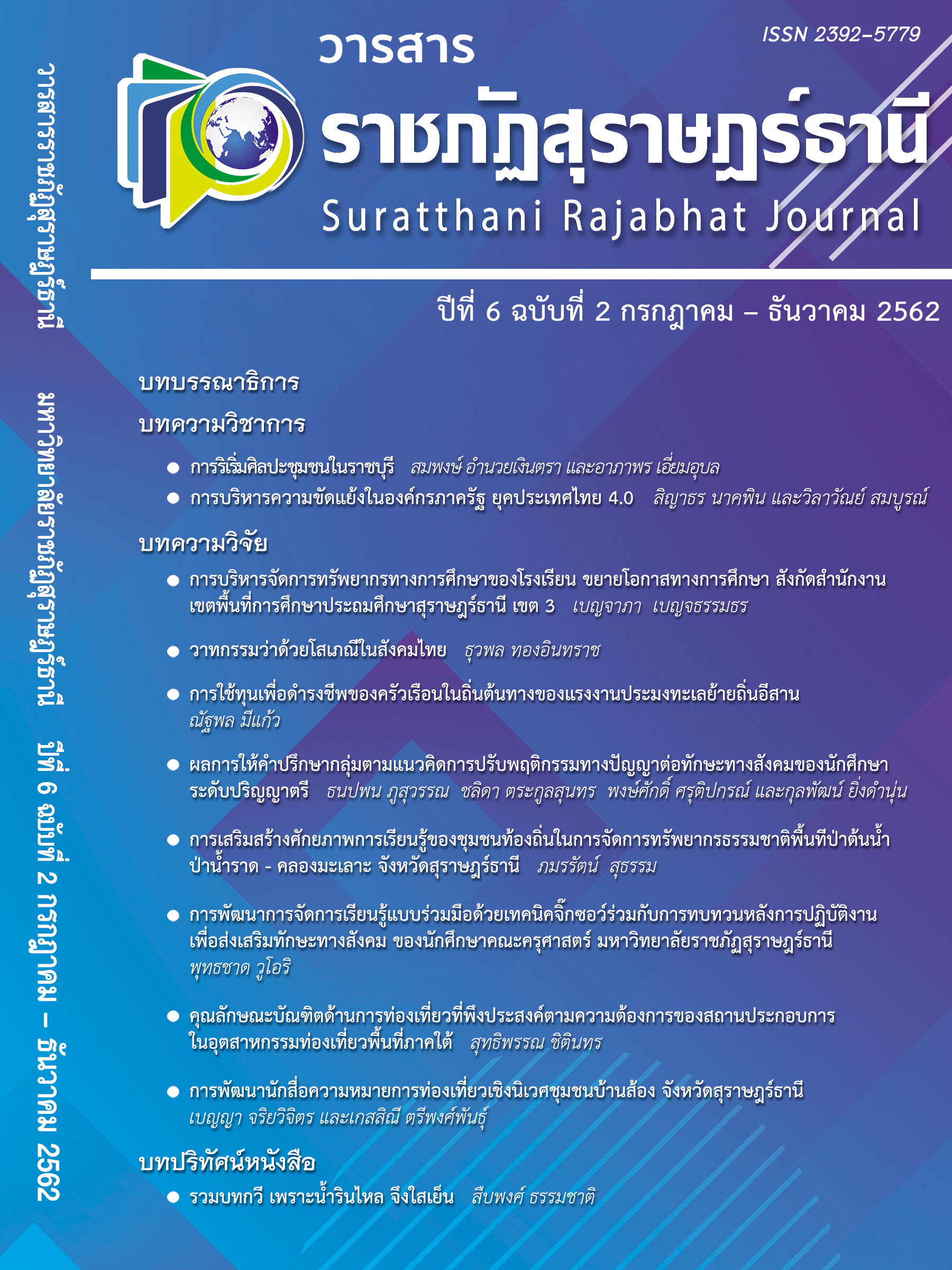Community - Based Ecotourism Interpreter Development in Ban Song Community, Suratthani Province
Main Article Content
Abstract
The objective of this research was to develop community-based ecotourism interpreters. This research examined a combination of qualitative and quantitative research methodologies using participatory action research (PAR) and the participatory developing process (Appreciation Influence Control Evaluation Techniques - AICE). Locale of the study was Ban Song community, Suratthani province. Data were obtained through interview, observation and questionnaire. Obtained data were analyzed by using content analysis and description statistics i.e. mean percentage, and standard deviation. Results of the study were as follows:
The results of the study have led to the development of community-based ecotourism interpreters process consisting of 4 steps: 1) creating community interpreters’ criteria and standard 2) assessing current competency of community interpreters 3) organizing practical training for community interpreters and 4) evaluation of the community interpreter development.
The researchers and members of Ban Song interpreter group have collaborated to develop a standard for local community interpreters, adapted from Thailand Tourist Guide Standard and CBT Standard Handbook by The Thailand Community Based Tourism Institute (CBT-I) and used as a guidelines for community-based ecotourism interpreters development consisting of 3 main issues: 1) qualification of community-based ecotourism interpreter 2) knowledge of community-based ecotourism interpreter and 3) roles, responsibilities and ethics of community-based ecotourism interpreter implemented the following steps: 1) assessing current competency of community-based ecotourism interpreter 2) organizing workshop and practice tour and 3) evaluating the development of community-based ecotourism interpreter.
Results of the evaluation process of community-based ecotourism interpreters standard by arranging familiarization trip (FAM Trip). The survey results shown that most of the respondents have a satisfaction level toward the standard of Ban Song community interpreters, the top three ranking were 1) appropriate behavior 2) work readiness 3) being community members and accepted by the community. By considering each aspect, it was found that the respondents were most satisfied with the qualification and characteristics of Ban Song community interpreters, followed by job skills according to roles, duties and responsibilities.
Article Details
References
กระทรวงท่องเที่ยวและกีฬา. (2558). ยุทธศาสตร์การท่องเที่ยวไทย พ.ศ. 2558-2560. สืบค้นเมื่อ 9 มีนาคม 2560, จาก https://www.mots.go.th/ewt_dl_link.php?nid=7114
ทิพาวรรณ วรรณมหินทร์. (2557). การสื่อความหมายมรดกวัฒนธรรมของชุมชนประวัติศาสตร์ในเกาะรัตนโกสินทร์. สืบค้นเมื่อ 13 มิถุนายน 2560, จาก doi.nrct.go.th/ListDoi/Download/328748/
ประกอบศิริ ภักดีพินิจ, และกรรณิกา พิมลศรี. (2553). โครงการศึกษาศักยภาพทางการท่องเที่ยวเพื่อกำหนดแนวทางการพัฒนาการท่องเที่ยวเมืองชายแดนภูซางอย่างยั่งยืน. กรุงเทพฯ: สำนักงานสนับสนุนการวิจัย.
รักธิดา ศิริ. (2557). การพัฒนาระบบสื่อความหมายบนพื้นฐานข้อมูล Green Map ของชุมชนเพื่อท่องเที่ยวโดยชุมชนแบบมีส่วนร่วม. สืบค้นเมื่อ 12 มิถุนายน 2560, จากhttp://www.stu2.mju.ac.th/openFile.aspx?id=MTQ2MzU0
ฤทัยภัทร พิมลศรี, และทศพล คุ้มสุพรรณ. (2557). พิพิธภัณฑ์มีชีวิต: สื่อเพื่อพัฒนาการท่องเที่ยวเชื่อมโยงวิถีชุมชนเมืองชายแดนภูซาง จังหวัดพะเยา. สืบค้นเมื่อ 20 มิถุนายน 2560, จากj-com-dev-and-life-qua.oop.cmu.ac.th/uploads/file/egkmnprsvz18.docx
สำนักเลขาธิการคณะรัฐมนตรี. (2560). แผนยุทธศาสตร์การท่องเที่ยวโดยชุมชนอย่างยั่งยืน พ.ศ. 2559 - 2563. สืบค้นเมื่อ 9 มีนาคม 2560, จาก http://cabinet.soc.go.th/soc/Program2-3.jsp?top_serl=99322945
สิทธิณัฐ ประพุทธนิติสาร. (2545). การวิจัยเชิงปฏิบัติการแบบมีส่วนร่วม: แนวคิดและแนวปฏิบัติ. เชียงใหม่ : วนิดาเพรส.
อรพินท์ สพโชคชัย. (2537). คู่มือการจัดการประชุมเพื่อระดมความคิดในการพัฒนาหมู่บ้าน. กรุงเทพฯ: สถาบันวิจัยเพื่อพัฒนาประเทศไทย.
Nakphin, S. et al. (2016). Enhancing Tourism Destination Standard focusing on Waterfall. International Conference on Business Management, Social Science and Sustainable Development BMSS-2018. Japan-Tokyo.


